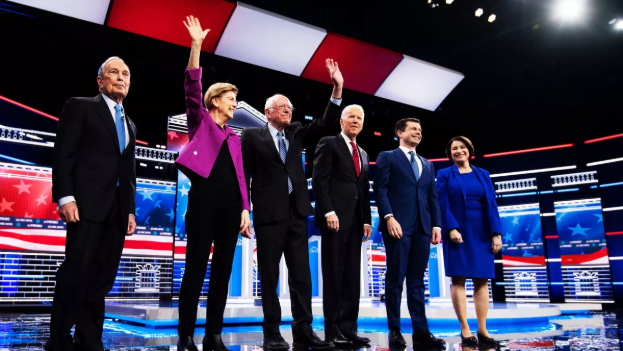What even happened during the early primaries?
February 25, 2020
On Feb. 3, 2020, Iowans determined the winner of the caucuses to be… no one? Both Sen. Bernie Sanders and Mayor Pete Buttigieg declared an early victory with Sen. Amy Klobuchar echoing both of their sentiments. Though the results came in eventually, the Democratic National Committee had a large time delay in releasing the results. Buttigieg and Sanders tied at 26.2%, but Sanders was only awarded 12 delegates compared to Buttigieg’s 13. Warren followed, winning 18% of the vote and 8 delegates.
The DNC stated that this delay was due to quality control purposes and technological issues, but a number of people point towards disorganization and a flawed caucus reporting system. The Joe Biden campaign published a letter denouncing the failures of the Iowa caucusing system and the reporting issues that caused the disorganization.
The Iowa Caucus debacle left many candidates confused and unsure what next steps to pursue, so most candidates placed the majority of their resources in New Hampshire where the following primary took place. Sen. Bernie Sanders, a New England resident, was slated to win the primary. Though Sen. Elizabeth Warren also lives around the area, her poor showing in Iowa exposed a general lack of support.
Sanders pulled through with a 25.7% of the votes, slightly over Iowa frontrunner Pete Buttigieg, who amassed 24.4% of the votes. Both candidates received nine delegates, though their vote counts were separated by 3,000 with Sanders winning 76,000.
Following the primary, the Democratic hopefuls flew to Nevada, where one of the last caucuses before Super Tuesday would take place. On the Tuesday before the caucuses, Nevada held the next Democratic debate—the first time that billionaire and former New York City Mike Bloomberg was on the debate stage throughout the primary process.
Though many have noted that the Democratic party has never been more divisive, there was one thing that was able to unify many 2020 hopefuls last Tuesday: their mutual disdain for Bloomberg. Warren attacked him for his 64 sexual harassment allegations and Non-Disclosure Agreements, Sanders questioned his healthcare stance and the infamous ‘Stop and Frisk’ law, and Biden pursued Bloomberg’s relationship with the Obama administration. Bloomberg saw the first statistically significant decline in his campaign after Nevada’s debate, dropping 3% almost overnight in the polls.
After arguably the most heated debate in the race, Nevada voters overwhelmingly voted to allocate delegates to Sen. Bernie Sanders. 24 delegates are currently going to Sanders, with Biden following with nine delegates. Buttigieg narrowly reached viability, and takes three delegates to the July convention.
This week, South Carolina has its primary, which is the final event before Super Tuesday. Biden is expected to win with a current 26.6% lead, followed by Sanders with 22.1%. The Biden campaign needs to regain ground in South Carolina in order to stay in the race, as his poor results in Iowa, New Hampshire, and Nevada point to a campaign that’s running out of support.
The total allocated delegates have Sanders and Buttigieg in first and second place, respectively, with Sanders holding onto 34 delegates and Buttigieg claiming 23. The remaining candidates have only 21 delegates combined, with Warren, Klobuchar, and Biden in third, fourth, and fifth place.
Klobuchar holds a 5% lead over Sen. Sanders in her home state of Minnesota at 26% and Sanders at 21% ahead of the Super Tuesday race, according to a UMass/Lowell poll released on Feb. 21 of 2020. Polls have Sanders leading in most Super Tuesday states, with the occasional Biden lead in Virginia and Oklahoma. Most notably is Sanders’ substantial 6% lead in California, where his delegate share might secure his spot as the Democratic nominee ahead of the general election.


